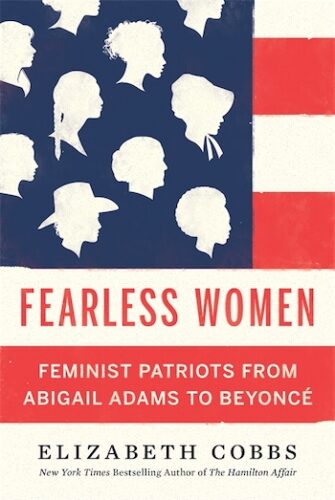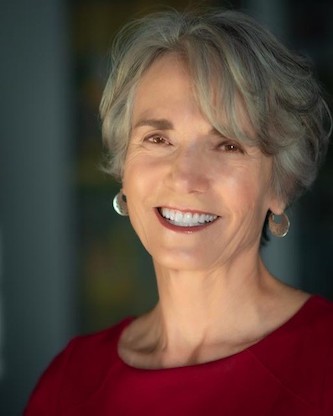Book Review: “Fearless Women” — A Vivid, Rounded Portrait of the Choices Facing America’s Women
By Roberta Silman
Fearless Women is so well written, so well researched, and so engaging that you will find it of real value even as it tells some stories you thought you already knew.
Fearless Women: Feminist Patriots From Abigail Adams to Beyoncé by Elizabeth Cobbs. Belknap Press, 448 Pages, $35.
 A copy of this book appeared out of nowhere several weeks ago, and, intrigued by the title, I read it and decided it would be an excellent Mother’s Day gift to my readers. But first a caveat: I must confess that although I am a strong believer in women’s rights and did my share of marching in the 1960s and ’70s, I was never what you would call an ardent feminist and did not spend a lot of time reading feminist authors. I knew The Second Sex and The Feminine Mystique and had even heard Andrea Dworkin speak when I was doing my MFA at Sarah Lawrence in the ’70s. Still, a lot of the material was new to me. To those of you who are more familiar with feminist and gender studies, that may not be the case. But this book is so well written, so well researched, and so engaging that I think you will find it of real value even as it tells some stories you thought you knew.
A copy of this book appeared out of nowhere several weeks ago, and, intrigued by the title, I read it and decided it would be an excellent Mother’s Day gift to my readers. But first a caveat: I must confess that although I am a strong believer in women’s rights and did my share of marching in the 1960s and ’70s, I was never what you would call an ardent feminist and did not spend a lot of time reading feminist authors. I knew The Second Sex and The Feminine Mystique and had even heard Andrea Dworkin speak when I was doing my MFA at Sarah Lawrence in the ’70s. Still, a lot of the material was new to me. To those of you who are more familiar with feminist and gender studies, that may not be the case. But this book is so well written, so well researched, and so engaging that I think you will find it of real value even as it tells some stories you thought you knew.
Although Elizabeth Cobbs is a professor of American History at Texas A & M University and has already written five nonfiction books and three novels, I had never heard of her. But it is clear from this immensely readable work, which is also an example of superb scholarship, that she has a unique gift of bringing all kinds of factual detail to vivid, memorable life. As the epigraph to her Prologue she cites Eleanor Roosevelt from 1935: “The fundamental purpose of feminism is that women should have equal opportunity and equal right with every other citizen.” As a child I read Eleanor’s column “My Day” and have lived by her belief that the mind as well as the body must receive daily exercise in order to stay fit. So I welcomed this hefty volume as a chance to see American history through women’s eyes. For that is what Cobbs has done in the eight chapters that explore the rights women have been seeking since the founding of the Republic. They are: the right to learn, to speak, to lobby, to vote, to earn, as well as the right to equal treatment, to compete, and, finally, the right to physical safety.
In each chapter she focuses on two women, beginning with Abigail Adams and Abigail Bailey and ending with Beyoncé Knowles-Carter and the Women of #MeToo. In between are people you have heard about, like Angelina Grimké and Susan B. Anthony and Frances Perkins and Phyllis Schlafly and Muriel Siebert, and others you probably have not, such as Yvonne Swan and Mary Church Terrell. But, as Cobbs tells this history of American women, she does so with such an authentic voice and provides such a wealth of knowledge and so many delicious details that it is hard to put this book down.

Historian Elizabeth Cobbs. Photo: Harvard University Press
Fearless Women is also sometimes hard to read. Racism is part of our legacy as a country, perhaps best illustrated by the agonizing story of Harriet Jacobs, who was hidden in an airless space for almost seven years before she could escape slavery. So is hardened prejudice against women — both white and Black — who were seen for a very long time as only fit to be the chattel of all-powerful men. Anyone who has read any American history knows about the men. What was also surprising to me was the turmoil among the women who refused to support the leaders in their midst and thus delayed their ability to attain certain rights, for not only years, but sometimes decades — for example, the arguments among such opinionated women as Elizabeth Cady Stanton and Susan Anthony and Ida Tarbell and Dorothy Day. Or the way men and also women went after someone like Frances Perkins — a Cabinet member under FDR who is responsible for much of the social safety net on which we all depend — when they tried to impeach her — unsuccessfully, thank God. Her story was the precursor to McCarthy’s attack on our democracy in the ’50s and to what is happening now. Or the nature of the language that had been used by the oppressors of both sexes throughout the second half of the 20th century — and is once again in vogue today — about who has control over women’s finances, their ability to own property, to pay taxes, to vote, to divorce, to see and gain custody of their children, and to have access to control over their bodies.
Cobbs seems to have encyclopedic knowledge of the women’s movement and with that knowledge she weaves the various threads into an intelligible whole. She also places the women’s struggles into the context of their times, so that you find yourself understanding, perhaps for the first time, the horrible chicanery that took place after the Civil War during Reconstruction and the Jim Crow era. Or how the Dust Bowl and the Depression slowed or moved this battle along. Or how Phyllis Schlafly’s strategy to “crush” her opponents, how she “courted polarization to vanquish moderates,” has fostered a legacy of division we are still dealing with today.
Although all the women — the main players as well as the supporting cast, like Pauli Murray and Mary Dewson and Florence Kelley and Ruth Bader Ginsburg and Shulamith Firestone and Gretchen Carlson among so many others — are admirable, I will single out two whom I didn’t know about and one whom my own mother admired: The first is Martha Cotera, a Mexican American activist from Texas, who is still alive and whose amazing courage and determination can be an inspiration for us all. In her book Profile of the Mexican American Woman, which “planted the flag for a new academic field,” Cotera offered facts about the women she wrote about, but also “wanted readers to turn the world upside down and see it from an entirely fresh angle.” She also wanted to make it clear to the higher-class white women who were beginning to embrace feminism in the ’70s that she didn’t need their condescending help. “Chicanas were ‘polished, battle-scarred veterans,’” she told the Texas Women’s Political Caucus in March 1972. “They had fought injustice long before these white women showed up.” Among the delectable details in Fearless Women is Cotera’s battle with Ann Richards to appoint more Hispanics for judgeships. And although Martha and her equally amazing architect-husband Juan suffered unspeakable tragedy when they lost their 25 year-old son to a random gang execution in 1997, she has continued to work for the cause of “helping Mexican Americans accept gender equality as a legitimate aspiration that could improve rather than divide their community.” Simply knowing about her and her insistence on her ideals (one of which is opposing the death penalty even for her child’s murderers) has reminded me why I love this country and so many of the people in it.

Muriel Siebert, the first woman to have bought herself a seat on the New York Stock Exchange. Photo: Makers
The second is Muriel Siebert, the first woman to have bought herself (italics mine) a seat on the New York Stock Exchange. My mother, who died in 1999 at 90, loved numbers and was fascinated by the world of finance. The story of Siebert, a small feisty Jewish woman born in 1928 to a modest family in Ohio, has a relatively happy ending, but its trajectory can be read as a cautionary tale about how women have been treated in this country and why we must be vigilant about the hard-earned right to compete as we move forward. And the right to equal pay. While telling Siebert’s story Cobbs reminds us:
By the end of the twentieth century, across all jobs, American women generally earned 75 percent of what men did. On Wall Street, by contrast, they took a measly 60 percent of their male peers’ salary, not because salaries were unequal, but because subjective evaluations determined year-end bonuses. As one scholar notes, at the end of the century the gap between bonuses for male and female professionals with identical financial performance averaged “an astounding $223,368.”
And finally, throughout Fearless Women runs the question that has plagued women forever: Can one be fearless in working for equal rights and still have a family? One of the most important threads in this book is how women managed to endure the joys and sorrows that afflict us simply because we are women: the desire for children, the miscarriages and stillbirths and child mortality that ensue if that is the choice. As these stories unfold Cobbs also examines the choice not to marry or to have children. That she manages to give us such a rounded portrait of the choices facing women in this country since its founding, with such an even hand, is testament to Cobb’s breadth of vision.
This is a terrific book that deserves an honored place on the shelves of anyone who is a mother or had a mother. We should all welcome the hope that it bestows.
Roberta Silman is the author of five novels, a short story collection and two children’s books. Her latest, Summer Lightning, has been released as a paperback, an ebook, and an audio book. Secrets and Shadows (Arts Fuse review), is in its second printing and is available on Amazon. It was chosen as one of the best Indie Books of 2018 by Kirkus and it is now available as an audio book from Alison Larkin Presents. A recipient of Fellowships from the Guggenheim Foundation and the National Endowment for the Arts, she has reviewed for the New York Times and Boston Globe, and writes regularly for the Arts Fuse. More about her can be found at robertasilman.com and she can also be reached at rsilman@verizon.net.

Thank you, Roberta! I’m honored by your comments. This book was a joy to write, so I’m especially pleased that you found it fun to read. Wonderful women, weren’t they?
Thanks for writing. Glad to help spread the word.